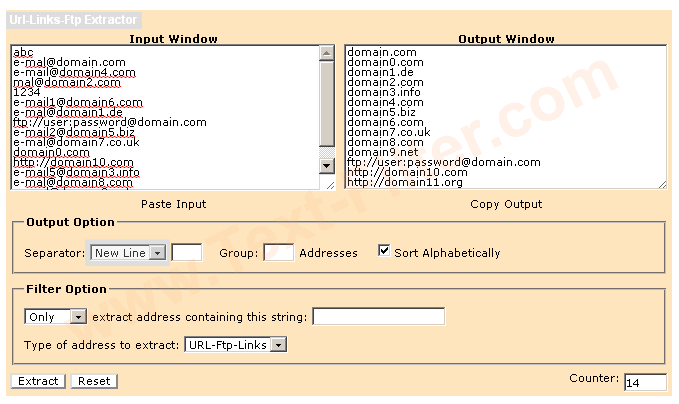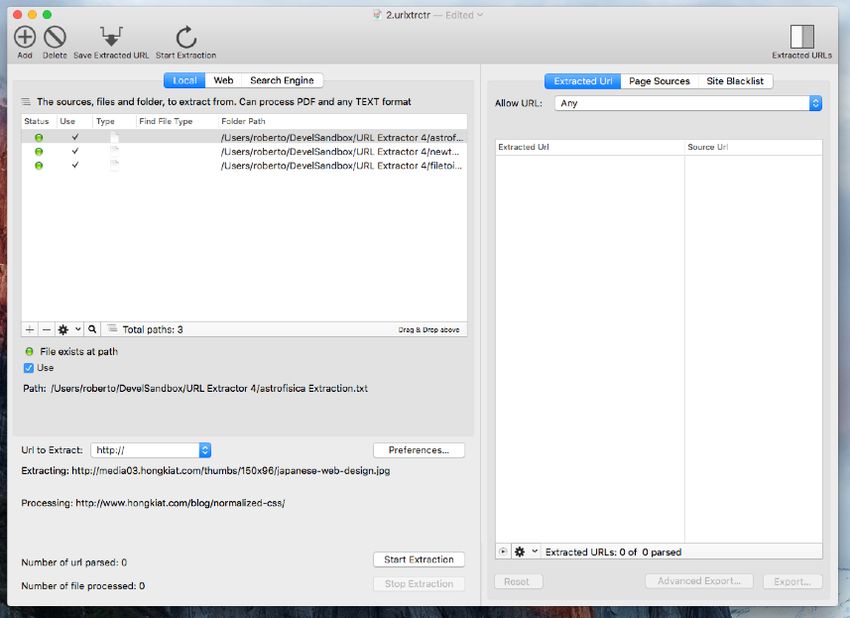- Url Extractor From Website
- Url Extractor Tool
- Extract Urls From Web Page
- Url Extractor Online
- Url Extractor 4
URL Extractor For Web Pages and Text Use this tool to extract URLs in web pages, data files, text and more. NewSupply list of web pages to scan. What can this tool do? Our Domain Extractor tool is designed for SEOs, Digital Marketers, Web Developers, and Webmasters. Extract Domain Online from any URL. What does our Domain Extractor Tool do? This free domain extractor tool helps you to extract domain names from a list of URLs or sub-domains to domains. This online domain extractor service has the following.
Latest versionReleased:
Collects and extracts URLs from given text.
Project description
URLExtract is python class for collecting (extracting) URLs from giventext based on locating TLD.
How does it work

It tries to find any occurrence of TLD in given text. If TLD is found itstarts from that position to expand boundaries to both sides searchingfor “stop character” (usually whitespace, comma, single or doublequote).
A dns check option is available to also reject invalid domain names.

NOTE: List of TLDs is downloaded from iana.org to keep you up to date with new TLDs.
Installation
Package is available on PyPI - you can install it via pip.
Url Extractor From Website
Documentation
Online documentation is published at http://urlextract.readthedocs.io/
Requirements
IDNA for converting links to IDNA format
uritools for domain name validation
appdirs for determining user’s cache directory
dnspython to cache DNS results
Example
You can look at command line program at the end of urlextract.py.But everything you need to know is this:
Or you can get generator over URLs in text by:
Or if you want to just check if there is at least one URL you can do:
If you want to have up to date list of TLDs you can use update():
or update_when_older() method:
Known issues
Since TLD can be not only shortcut but also some meaningful word we might see “false matches” when we are searchingfor URL in some HTML pages. The false match can occur for example in css or JS when you are referring to HTML itemusing its classes.
Example HTML code:
If this HTML snippet is on the input of urlextract.find_urls() it will return p.bold.name as an URL.Behavior of urlextract is correct, because .name is valid TLD and urlextract just see that there is bold.namevalid domain name and p is valid sub-domain.
License
This piece of code is licensed under The MIT License.
Url Extractor Tool
Release historyRelease notifications | RSS feed
1.2.0
1.1.0
1.0.0
0.14.0
0.13.0
0.12.1
0.11
0.10
0.9
0.8.3
0.7
0.6
0.5

0.4.1
0.4
0.3.2.6
0.3.2.5
0.3.2.4
0.3.2.3
0.3.2.2
0.3.2.1
0.3.2
0.3.1
0.3
Extract Urls From Web Page
0.2.7
Download files
Download the file for your platform. If you're not sure which to choose, learn more about installing packages.
| Filename, size | File type | Python version | Upload date | Hashes |
|---|---|---|---|---|
| Filename, size urlextract-1.2.0-py3-none-any.whl (19.8 kB) | File type Wheel | Python version py3 | Upload date | Hashes |
| Filename, size urlextract-1.2.0.tar.gz (29.3 kB) | File type Source | Python version None | Upload date | Hashes |
Url Extractor Online
Hashes for urlextract-1.2.0-py3-none-any.whl
Url Extractor 4
| Algorithm | Hash digest |
|---|---|
| SHA256 | c41fa7e1c75a6bdc00744b44f61ad97be84b0d3d99ee1c5218b625a4377c00d8 |
| MD5 | 904b331819182fde89dff01de145fc82 |
| BLAKE2-256 | c3240f5c690a4ef9b5d30845517ef14c35ce6a3d96e5b0ae0db6895bb194ab10 |
Hashes for urlextract-1.2.0.tar.gz
| Algorithm | Hash digest |
|---|---|
| SHA256 | 381488cd655e0be917a2c8cd18893c62a5e8edffe305c2bb75822cec2597e275 |
| MD5 | 24f8bc3aeca437c4af01150c5475adc5 |
| BLAKE2-256 | 5676619fd29abc0cddc4bfd4e21d616867ee028b210726b347e7627e9cbc4f0d |

Comments are closed.